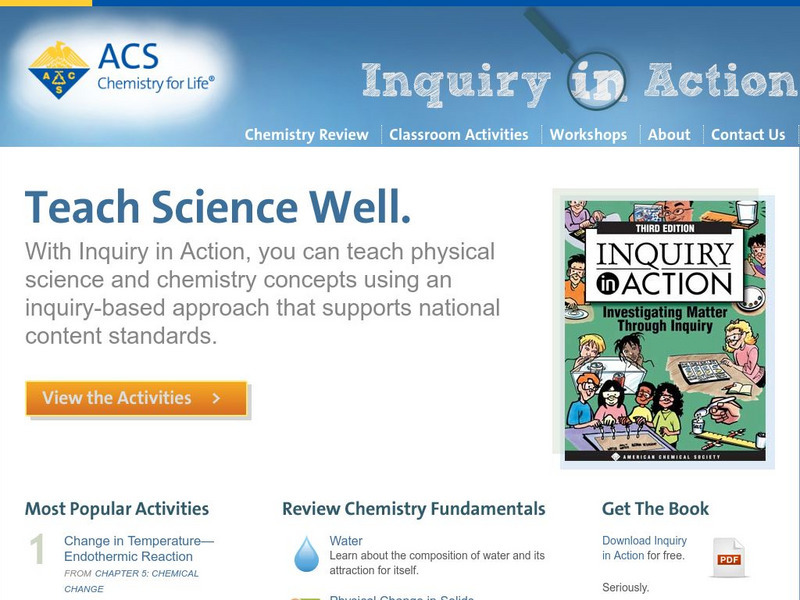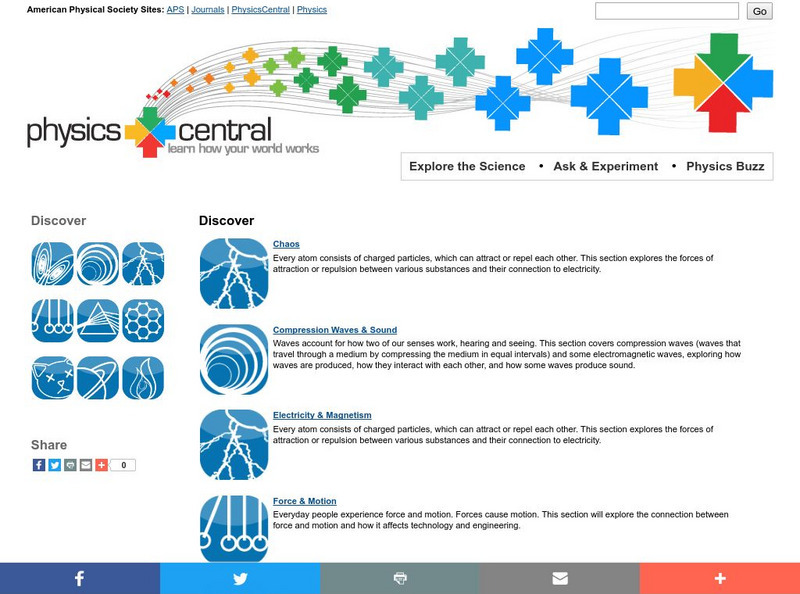American Museum of Natural History
Train of Thought
Hop aboard the train of thought. A remote learning resource has learners consider thought experiments to consider scientific theories. It provides two examples, one on orbiting bodies and the other on the speed of light, for them to work...
Weber State University
The Sun and the Seasons
Why is there more daylight in June than in December if you live above the equator? How does the angle of sunlight shift throughout the year? Answer these questions and more with an interactive article about the sun, its path through the...
American Museum of Natural History
Einstein in Time
Einstein sure had an interesting life. Using a remote learning resource, pupils examine a timeline of Einstein's life. They learn about the major scientific discoveries as well as humanitarian and social work. Additionally, they read...
American Chemical Society
American Chemical Society: Inquiry in Action: Teach Science Well
Online textbook reviews fundamentals of chemistry and physical science via slideshow presentations, notes, and videos. Materials for classroom activities engage students in inquiry-based, hands-on investigations covering molecular...
American Chemical Society
American Chemical Society: Inquiry in Action: Teach Science Well
Online textbook reviews fundamentals of chemistry and physical science via slideshow presentations, notes, and videos. Materials for classroom activities engage students in inquiry-based, hands-on investigations covering molecular...
Physics Central
American Physical Society: Physics Central: Discover Homepage
Link to nine major physics topics and dig deeper into the content. Find out about the work of scientists in each field and see example physical science experiments.
Science Buddies
Science Buddies: Career Profile: Film and Video Editor
After the cameras roll, someone has to spruce up the film and cut out what is unnecessary to make the story flow well. That's the job of the film editor. Read this Science Buddies career profile to find out the skills you need as well as...
Ducksters
Ducksters: Physics for Kids: Motion Glossary and Terms
Kids learn about glossary and terms in the science of physics and motion. Definitions for words such as momentum, force, work, energy, gravity, scalar, vector, power, and more.
Other
Bscs: Bscs Science Teaching Video Library
Elementary teachers have an urgent need for high-quality science classroom videos. To respond as rapidly as possible, BSCS Science Learning has made some of our best K-12 videos available for free streaming. In this collection, you'll...
Ducksters
Ducksters: Physics for Kids: Laws of Motion
Kids learn about the science behind the basic three Laws of Motion. Forces theory discovered by Isaac Newton.
Ducksters
Ducksters: Physics for Kids: Force
Kids learn about force in the science of physics and the laws of motion including units and measurement. How to calculate force from mass and acceleration.
Ducksters
Ducksters: Physics for Kids: Work
Kids learn about work in the science of physics and the laws of motion including units and measurement. Calculate work using force times distance.
Ducksters
Ducksters: Physics for Kids: Kinetic Energy
Kids learn about kinetic energy in the science of physics. The energy of motion can be calculated using mass and velocity. The standard unit is the joule. How it is different from potential energy.
Ducksters
Ducksters: Physics for Kids: Mass and Weight
Kids learn about mass and weight in the science of physics and the laws of motion including units and measurement. What is the difference between mass and weight?
Ducksters
Ducksters: Physics for Kids: Momentum and Collisions
Kids learn about momentum and collisions in the science of physics and the laws of motion including units and measurement. Calculate momentum using mass times velocity.
Ducksters
Ducksters: Physics for Kids: Power
Kids learn about power in the science of physics and the laws of motion including units and measurement in watts. Calculate power using work divided by time.
Ducksters
Ducksters: Physics for Kids: Pressure
Kids learn about pressure in the science of physics and the laws of motion including units and measurement in pascals. Calculate pressure using force divided by area.
Ducksters
Ducksters: Physics for Kids: Acceleration
Kids learn about acceleration in the science of physics and the laws of motion including units and measurement. How to calculate it from the change in velocity over the change in time.
NASA
Nasa: Rockets Educator Guide: How Rockets Work
In this article, learn how rockets work. Discover Newton's Law of Motion and learn how it supports rocketry.
Scholastic
Scholastic:magic School Bus Themes Index
Magic School Bus cross referenced by themes to provide quick access to many activities and references.
Other
Einstein Archives Online
Online access to portions of Einstein's original papers and manuscripts.
NASA
Nasa: Rockets Educator Guide: Applying Newton's Laws
Learn how Newton's Laws apply to rocketry. Discover how rockets work, including the engines and propellants.





















